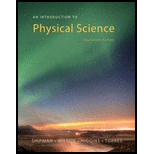
An Introduction to Physical Science
14th Edition
ISBN: 9781305079137
Author: James Shipman, Jerry D. Wilson, Charles A. Higgins, Omar Torres
Publisher: Cengage Learning
expand_more
expand_more
format_list_bulleted
Concept explainers
Question
Chapter 19, Problem 4SA
(a)
To determine
The temperature variation in the mesosphere.
(b)
To determine
The temperature variation in the stratosphere.
(c)
To determine
The temperature variation in the troposphere.
(d)
To determine
The temperature variation in the thermosphere.
Expert Solution & Answer
Want to see the full answer?
Check out a sample textbook solution
Students have asked these similar questions
No chatgpt pls will upvote
No chatgpt pls will upvote
No chatgpt pls will upvote
Chapter 19 Solutions
An Introduction to Physical Science
Ch. 19.1 - What are the four major gaseous constituents of...Ch. 19.1 - Prob. 2PQCh. 19.2 - Prob. 1PQCh. 19.2 - Prob. 2PQCh. 19.3 - Prob. 1PQCh. 19.3 - Prob. 2PQCh. 19.3 - Prob. 19.1CECh. 19.4 - Prob. 1PQCh. 19.4 - Prob. 2PQCh. 19.5 - Prob. 1PQ
Ch. 19.5 - Prob. 2PQCh. 19 - KEY TERMS 1. atmospheric science (Intro) 2....Ch. 19 - Prob. BMCh. 19 - Prob. CMCh. 19 - Prob. DMCh. 19 - Prob. EMCh. 19 - KEY TERMS 1. atmospheric science (Intro) 2....Ch. 19 - Prob. GMCh. 19 - Prob. HMCh. 19 - Prob. IMCh. 19 - Prob. JMCh. 19 - Prob. KMCh. 19 - Prob. LMCh. 19 - Prob. MMCh. 19 - Prob. NMCh. 19 - Prob. OMCh. 19 - Prob. PMCh. 19 - Prob. QMCh. 19 - KEY TERMS 1. atmospheric science (Intro) 2....Ch. 19 - Prob. SMCh. 19 - Prob. TMCh. 19 - Prob. UMCh. 19 - Prob. VMCh. 19 - Prob. WMCh. 19 - Prob. XMCh. 19 - Prob. YMCh. 19 - Prob. ZMCh. 19 - Prob. AAMCh. 19 - Prob. BBMCh. 19 - Prob. CCMCh. 19 - Prob. DDMCh. 19 - Prob. 1MCCh. 19 - Prob. 2MCCh. 19 - Photosynthesis is responsible for the atmospheric...Ch. 19 - What regulates the Earths average temperature?...Ch. 19 - Prob. 5MCCh. 19 - Prob. 6MCCh. 19 - Prob. 7MCCh. 19 - Prob. 8MCCh. 19 - Prob. 9MCCh. 19 - Prob. 10MCCh. 19 - What is the cloud root name that means heap?...Ch. 19 - Prob. 12MCCh. 19 - Prob. 1FIBCh. 19 - Prob. 2FIBCh. 19 - Prob. 3FIBCh. 19 - Prob. 4FIBCh. 19 - One standard atmosphere of pressure is ___ lb2....Ch. 19 - Prob. 6FIBCh. 19 - Prob. 7FIBCh. 19 - Prob. 8FIBCh. 19 - Prob. 9FIBCh. 19 - Prob. 10FIBCh. 19 - Prob. 11FIBCh. 19 - Prob. 12FIBCh. 19 - Prob. 1SACh. 19 - Prob. 2SACh. 19 - Prob. 3SACh. 19 - Prob. 4SACh. 19 - Prob. 5SACh. 19 - Prob. 6SACh. 19 - Prob. 7SACh. 19 - Prob. 8SACh. 19 - Prob. 9SACh. 19 - In terms of Rayleigh scattering, why is it...Ch. 19 - Prob. 11SACh. 19 - Prob. 12SACh. 19 - What are the four fundamental atmospheric...Ch. 19 - Prob. 14SACh. 19 - Prob. 15SACh. 19 - When is the relative humidity 100%? It may be...Ch. 19 - Which way, relative to the wind direction, does a...Ch. 19 - Prob. 18SACh. 19 - Prob. 19SACh. 19 - What is a convection cycle, and what are the...Ch. 19 - Prob. 21SACh. 19 - Why does weather generally move from west to east...Ch. 19 - Prob. 23SACh. 19 - Prob. 24SACh. 19 - Name the cloud family for each of the following:...Ch. 19 - Prob. 26SACh. 19 - Prob. 27SACh. 19 - Why are clouds generally white, while some are...Ch. 19 - Visualize the connections and give answers in the...Ch. 19 - (a) Why does the land lose heat more quickly at...Ch. 19 - Prob. 2AYKCh. 19 - Prob. 3AYKCh. 19 - Prob. 4AYKCh. 19 - Water leaks from a cup with a hole, as shown in ...Ch. 19 - Express the approximate thicknesses of the (a)...Ch. 19 - Prob. 2ECh. 19 - If the air temperature is 70F at sea level, then...Ch. 19 - If the air temperature is 20C at sea level, then...Ch. 19 - On a day when the air temperature is 85F, the...Ch. 19 - Prob. 6ECh. 19 - On a very hot day with an air temperature of 105F,...Ch. 19 - On a winter day, a psychrometer has a dry-bulb...Ch. 19 - The dry-bulb and wet-bulb thermometers of a...Ch. 19 - Prob. 10ECh. 19 - On a day when the air temperature is 70F, a fellow...Ch. 19 - On another day with the same air temperature...
Knowledge Booster
Learn more about
Need a deep-dive on the concept behind this application? Look no further. Learn more about this topic, physics and related others by exploring similar questions and additional content below.Similar questions
- You are standing a distance x = 1.75 m away from this mirror. The object you are looking at is y = 0.29 m from the mirror. The angle of incidence is θ = 30°. What is the exact distance from you to the image?arrow_forwardFor each of the actions depicted below, a magnet and/or metal loop moves with velocity v→ (v→ is constant and has the same magnitude in all parts). Determine whether a current is induced in the metal loop. If so, indicate the direction of the current in the loop, either clockwise or counterclockwise when seen from the right of the loop. The axis of the magnet is lined up with the center of the loop. For the action depicted in (Figure 5), indicate the direction of the induced current in the loop (clockwise, counterclockwise or zero, when seen from the right of the loop). I know that the current is clockwise, I just dont understand why. Please fully explain why it's clockwise, Thank youarrow_forwardA planar double pendulum consists of two point masses \[m_1 = 1.00~\mathrm{kg}, \qquad m_2 = 1.00~\mathrm{kg}\]connected by massless, rigid rods of lengths \[L_1 = 1.00~\mathrm{m}, \qquad L_2 = 1.20~\mathrm{m}.\]The upper rod is hinged to a fixed pivot; gravity acts vertically downward with\[g = 9.81~\mathrm{m\,s^{-2}}.\]Define the generalized coordinates \(\theta_1,\theta_2\) as the angles each rod makes with thedownward vertical (positive anticlockwise, measured in radians unless stated otherwise).At \(t=0\) the system is released from rest with \[\theta_1(0)=120^{\circ}, \qquad\theta_2(0)=-10^{\circ}, \qquad\dot{\theta}_1(0)=\dot{\theta}_2(0)=0 .\]Using the exact nonlinear equations of motion (no small-angle or planar-pendulumapproximations) and assuming the rods never stretch or slip, determine the angle\(\theta_2\) at the instant\[t = 10.0~\mathrm{s}.\]Give the result in degrees, in the interval \((-180^{\circ},180^{\circ}]\).arrow_forward
- What are the expected readings of the ammeter and voltmeter for the circuit in the figure below? (R = 5.60 Ω, ΔV = 6.30 V) ammeter I =arrow_forwardsimple diagram to illustrate the setup for each law- coulombs law and biot savart lawarrow_forwardA circular coil with 100 turns and a radius of 0.05 m is placed in a magnetic field that changes at auniform rate from 0.2 T to 0.8 T in 0.1 seconds. The plane of the coil is perpendicular to the field.• Calculate the induced electric field in the coil.• Calculate the current density in the coil given its conductivity σ.arrow_forward
- An L-C circuit has an inductance of 0.410 H and a capacitance of 0.250 nF . During the current oscillations, the maximum current in the inductor is 1.80 A . What is the maximum energy Emax stored in the capacitor at any time during the current oscillations? How many times per second does the capacitor contain the amount of energy found in part A? Please show all steps.arrow_forwardA long, straight wire carries a current of 10 A along what we’ll define to the be x-axis. A square loopin the x-y plane with side length 0.1 m is placed near the wire such that its closest side is parallel tothe wire and 0.05 m away.• Calculate the magnetic flux through the loop using Ampere’s law.arrow_forwardDescribe the motion of a charged particle entering a uniform magnetic field at an angle to the fieldlines. Include a diagram showing the velocity vector, magnetic field lines, and the path of the particle.arrow_forward
- Discuss the differences between the Biot-Savart law and Coulomb’s law in terms of their applicationsand the physical quantities they describe.arrow_forwardExplain why Ampere’s law can be used to find the magnetic field inside a solenoid but not outside.arrow_forward3. An Atwood machine consists of two masses, mA and m B, which are connected by an inelastic cord of negligible mass that passes over a pulley. If the pulley has radius RO and moment of inertia I about its axle, determine the acceleration of the masses mA and m B, and compare to the situation where the moment of inertia of the pulley is ignored. Ignore friction at the axle O. Use angular momentum and torque in this solutionarrow_forward
arrow_back_ios
SEE MORE QUESTIONS
arrow_forward_ios
Recommended textbooks for you
 An Introduction to Physical SciencePhysicsISBN:9781305079137Author:James Shipman, Jerry D. Wilson, Charles A. Higgins, Omar TorresPublisher:Cengage Learning
An Introduction to Physical SciencePhysicsISBN:9781305079137Author:James Shipman, Jerry D. Wilson, Charles A. Higgins, Omar TorresPublisher:Cengage Learning AstronomyPhysicsISBN:9781938168284Author:Andrew Fraknoi; David Morrison; Sidney C. WolffPublisher:OpenStax
AstronomyPhysicsISBN:9781938168284Author:Andrew Fraknoi; David Morrison; Sidney C. WolffPublisher:OpenStax Foundations of Astronomy (MindTap Course List)PhysicsISBN:9781337399920Author:Michael A. Seeds, Dana BackmanPublisher:Cengage Learning
Foundations of Astronomy (MindTap Course List)PhysicsISBN:9781337399920Author:Michael A. Seeds, Dana BackmanPublisher:Cengage Learning
 Stars and GalaxiesPhysicsISBN:9781305120785Author:Michael A. Seeds, Dana BackmanPublisher:Cengage Learning
Stars and GalaxiesPhysicsISBN:9781305120785Author:Michael A. Seeds, Dana BackmanPublisher:Cengage Learning Horizons: Exploring the Universe (MindTap Course ...PhysicsISBN:9781305960961Author:Michael A. Seeds, Dana BackmanPublisher:Cengage Learning
Horizons: Exploring the Universe (MindTap Course ...PhysicsISBN:9781305960961Author:Michael A. Seeds, Dana BackmanPublisher:Cengage Learning

An Introduction to Physical Science
Physics
ISBN:9781305079137
Author:James Shipman, Jerry D. Wilson, Charles A. Higgins, Omar Torres
Publisher:Cengage Learning

Astronomy
Physics
ISBN:9781938168284
Author:Andrew Fraknoi; David Morrison; Sidney C. Wolff
Publisher:OpenStax

Foundations of Astronomy (MindTap Course List)
Physics
ISBN:9781337399920
Author:Michael A. Seeds, Dana Backman
Publisher:Cengage Learning


Stars and Galaxies
Physics
ISBN:9781305120785
Author:Michael A. Seeds, Dana Backman
Publisher:Cengage Learning

Horizons: Exploring the Universe (MindTap Course ...
Physics
ISBN:9781305960961
Author:Michael A. Seeds, Dana Backman
Publisher:Cengage Learning
A Level Physics – Ideal Gas Equation; Author: Atomi;https://www.youtube.com/watch?v=k0EFrmah7h0;License: Standard YouTube License, CC-BY